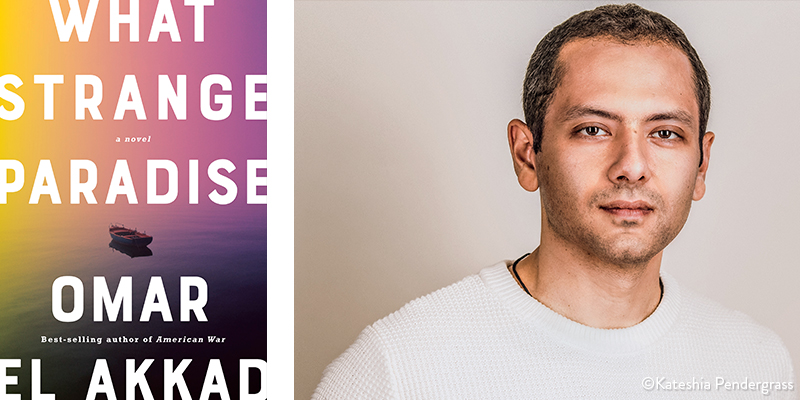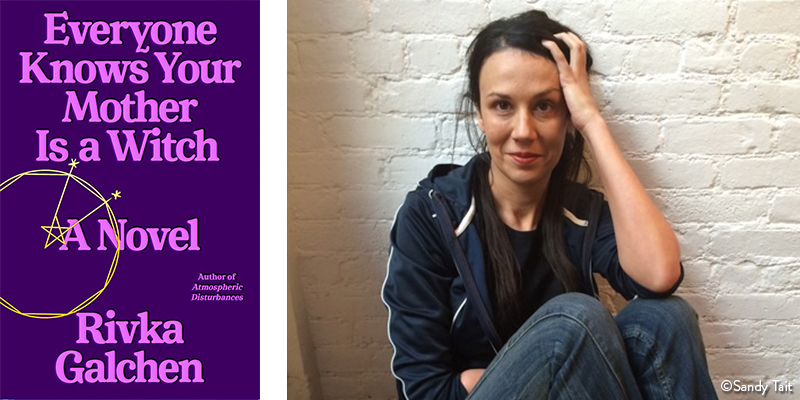Interviews
by Rhianna Walton, July 19, 2021 3:28 PM

Portland-based writer Omar El Akkad’s latest work, What Strange Paradise, is a beautiful, angry novel about the migrant crisis in Europe. Expertly teasing out the strings of exile, pride, greed, trauma, longing, and hope that entangle his diverse characters, El Akkad makes clear indictments without sacrificing the complex emotions of the “bad” actors — the smugglers, the Greek islanders struggling with an influx of migrants, the apathetic tourists, a nationalistic and traumatized military. Simultaneously a narrative of hope and a devastating portrait of what is happening in our world, right now, What Strange Paradise is an example of how fiction at its best does more to explicate and illuminate the challenges we face than any newspaper headline or documentary could accomplish. It was a pleasure to speak with El Akkad about What Strange Paradise and his take on the interplay between politics and fiction...
|
Interviews
by Rhianna Walton, June 23, 2021 10:04 AM

It’s hard to introduce award-winning novelist Rivka Galchen’s latest work, Everyone Knows Your Mother Is a Witch, without eclipsing some aspect of its value and achievement. It’s hilarious, in a way I didn’t think possible when the subject is the real-life persecution of astronomer Johannes Kepler’s elderly mother. It’s relatable, in a way I didn’t think possible when the setting is 17th-century Germany on the cusp of the Thirty Years’ War. And it’s poignant and philosophical, an examination of motherhood, neighborhood, science, magic, and culpability that I knew possible only because I’ve read Galchen before and was prepared for her singular ability to breathe life, logic, and beauty into the absurd. To quote Karen Russell, "I need no witchcraft to predict it will astonish, beguile, and transform you." It's very exciting to present Everyone Knows Your Mother Is a Witch as Volume 92 of Indiespensable...
|
Interviews
by Rhianna Walton, April 8, 2021 11:02 AM
Sanjena Sathian’s novel Gold Diggers marks the arrival of a gifted and imaginative writer. Set primarily in a suburb of Atlanta, Georgia, in the early aughts, Gold Diggers is narrated by Neil Narayan, a well-intentioned teenager struggling to balance the expectations of his Indian immigrant family and community with his own desires for success, belonging, and love. A deft coming-of-age novel suffused with magical realism, alchemy, history, romance, and a knowing humor that pokes at the realities of second-generation immigrant experiences in 21st-century America, Gold Diggers is a whip-smart and surprising debut.
Rhianna Walton: When did you first become interested in alchemy, and what inspired you to incorporate it — and magic more generally — into the novel?
Sanjena Sathian: Well, I should say the whole thing started pre-magic. Gold is such a big part of the Indian culture, Indian American culture. Then it, obviously, has all these parallels in American culture too.
I started out by being interested in this spate of gold thefts that had happened in Atlanta when I was growing up here...
|
Interviews
by Rhianna Walton, January 19, 2021 9:27 AM
Upon first read, award-winning author Chang-rae Lee’s latest novel, My Year Abroad, is a surreal picaresque that revels in Lee’s facility for humor and pyrotechnic prose. Pulling its young hero, Tiller, from the comic banality of suburban America into an intoxicating, if terrifying, journey through the casinos, brothels, karaoke clubs, and luxury mansions of Asia, the novel’s indelible cast of characters and increasingly outlandish scenes made us laugh out loud. But beneath its rowdy exterior, My Year Abroad is a tender work, keenly interested in what it means — and what it takes — to be fully present for oneself and others. It was a joy to speak with Lee about his riotous and reverent new novel, and is a pleasure to present it as Volume 90 of Indiespensable.
Rhianna Walton: Something I was thinking about while reading is that My Year Abroad is very much a picaresque in the way it pops gleefully from one outlandish episode to the other with its plucky hero, except Tiller's not typical of the genre...
|
Interviews
by Rhianna Walton, October 28, 2020 4:00 PM
I spoke with Rumaan Alam on the same day that his third novel, Leave the World Behind, made the shortlist for the 2020 National Book Award for Fiction. The dark — and darkly funny — story of how an upper-middle-class white family from Brooklyn and a wealthy Black couple from the Upper East Side cope with the possible end of humanity, while accidentally sharing a vacation home, Leave the World Behind uses the tropes of horror to explore the real effects of race, class, and technology on relationships and survival. Chillingly plausible, critical, and generous, Leave the World Behind is a gripping combination of can’t-put-it-down thriller and a meticulous excavation of the ways adults perpetually succeed and fail in creating a just and stable world. It's a delight to present Alam's riveting novel as Volume 89 of Indiespensable.
Rhianna Walton: I read Leave the World Behind during an especially bad wildfire season in Oregon that kept us housebound, and that coincided with ongoing COVID-19 restrictions, political violence downtown, a windstorm, and a blackout. It made me second-guess calling the novel dystopian because that implies future doom…
|
Interviews
by Jill Owens, September 11, 2020 9:20 AM
Jennifer Nansubuga Makumbi is the author of Kintu, which The New York Times Book Review calls “magisterial” and The Guardian describes as “a novel that is inventive in scope, masterful in execution….she does for Ugandan literature what Chinua Achebe did for Nigerian writing,” and Let’s Tell This Story Properly, a collection of short fiction which Publishers Weekly calls “thoughtful, eloquent.” Her newest novel, A Girl Is a Body of Water, is a fascinating, sweeping, and compelling family portrait, centering on Kirabo, a young girl growing up in the ’70s and ’80s in Uganda. It is also a thoughtful exploration of girlhood, womanhood, and feminism, featuring a cast of strong and vivid aunts, grandmothers, and friends. Kirabo doesn’t know who or where her mother is, and enlists Nsuuta, a witch who is entangled with Kirabo’s family, to try and find answers. She also wants to get rid of her emerging secret self, which is causing her to fly...
|
Interviews
by Rhianna Walton, July 16, 2020 3:58 PM
Acclaimed novelist Gail Tsukiyama’s latest novel, The Color of Air, transports the reader to the verdant rain forests and smoldering lava beds of Hawai‘i in the early 20th century. Centering on the Japanese American immigrant community of Hilo on the Big Island of Hawai‘i, The Color of Air takes an intimate look at how a diverse group of individuals navigate backbreaking work on the sugar plantations, institutionalized racism and segregation, illness, heartbreak, and natural disasters by forming an extended family deeply tied to one another and to the land. Kirkus writes, “Well-paced and lush, this is a captivating historical novel that shows the power of love and human resilience.” It was a pleasure to speak with Gail Tsukiyama about The Color of Air, Hawai‘i, and her approach to craft...
|
Interviews
by Jill Owens, March 12, 2020 4:40 PM
Anne Enright is an extraordinary, masterful writer whose prose brims with confidence, intelligence, and wit. She might be best known for her Man Booker Prize-winning novel The Gathering, or perhaps The Forgotten Waltz, which won the Andrew Carnegie Medal for Excellence in Fiction. Her last book, The Green Road, was named one of The Guardian’s 100 Best Books of the 21st Century, and Enright served as the inaugural Irish Fiction Laureate. Actress, her newest novel, is the story of Katherine O’Dell, briefly one of the most famous actresses in Ireland, as told through her daughter Norah’s eyes. It is an indelible portrait of an unforgettable character, and encapsulates two generations of women’s lives in Ireland, including marriage, politics, affairs, love, and tragic secrets. In a starred review, Kirkus calls Actress "[a]nother triumph for Enright: a confluence of lyrical prose, immediacy, warmth, and emotional insight." We are proud to choose Actress as Volume 85 of our Indiespensable subscription...
|
Interviews
by Rhianna Walton, January 16, 2020 9:16 AM
It was only when I started describing Little Gods to people that I realized how seamlessly debut novelist Meng Jin integrates the huge, complicated themes of revolution, rebirth, time, and language into an intimate story, without sacrificing their grandeur or significance. At its heart, Little Gods is the story of a scientist, Su Lan, whose brilliance both attracts and alienates the people who love her. While her husband, child, and friends circle around her like planets to a sun, she struggles to use her fire to light the way forward and incinerate the past. Set against the backdrop of the 1989 student uprisings in China, and later in the anonymity and dislocation of the American immigrant experience, Little Gods is a beautiful exploration of how the political is the personal, and of the invisible cords that tie us to our histories — both private and collective — despite our best efforts to only look forward...
|
Interviews
by Jill Owens, October 28, 2019 9:40 AM
Ben Lerner is a critically acclaimed poet, novelist, and essayist with plenty of well-deserved accolades — he's currently a MacArthur Fellow, has been a Guggenheim Fellow and a finalist for the National Book Award, and has won the Believer Book Award and the Hayden Carruth Award, among others. In his newest work, The Topeka School, the main character is Adam Gordon, who is also the narrator of Lerner’s debut novel, Leaving the Atocha Station; we see Adam here largely as an adolescent growing up in Topeka, Kansas, with his psychologist parents, who are part of the Foundation, an esteemed, groundbreaking psychological institute and progressive hub in a very conservative state. Lerner utilizes multiple perspectives and voices, including those of Adam's parents, to thoroughly investigate the history of this family and how it ties to our present moment, parsing themes of debate, masculinity, and the dissolution of language...
|